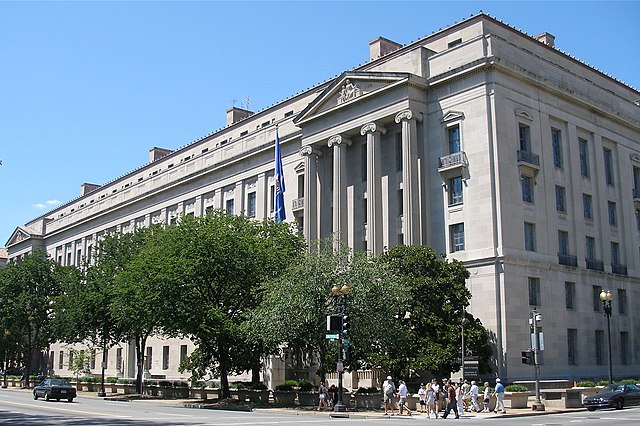DEPARTMENT OF JUSTICE IN THE NEWS
Mid-April Trends
This is the latest installment of a new biweekly blog series from RDP. Every two weeks, we call out ongoing trends in media coverage of the Justice Department’s focus and priorities, giving context from our past DOJ oversight work as needed, with an eye to the impact of DOJ capacity and resources, as well as alignment with the Biden administration’s professed goals.
- DOJ sues Norfolk Southern over February train derailment.
On March 31, the Justice Department sued Norfolk Southern over its February train derailment and toxic chemical spill in East Palestine, OH. The DOJ suit, following up a pending suit by the state of Ohio, intends to ensure the train operator pays the full costs of cleanup for the spill, which as we’ve written about previously, has killed thousands of animals, polluted local ecosystems, and made both residents and a team of visiting CDC investigators sick, raising concerns about longer-term health effects for locals.
Experts still don’t understand why the “cocktail” of chemicals spilled in the crash appears to be causing the symptoms that East Palestine residents and now government investigators are reporting—none of the substances that have been accounted for are known to cause these health effects, and after testing, officials have been assuring East Palestine residents that the surrounding air and drinking water are clean and safe. That said, EPA officials are presumably only testing for known chemicals with associated testing protocols — any mixing of chemicals into combined substances not previously tested for proximity to humans and animals would naturally not be detected, because officials would not be looking for them.
The situation is a harsh reminder of the limitations of both scientists’ and regulators’ ability to predict and mitigate against industrial practices that present substantial health and environmental risks. The railroad industry, with its long history of maximizing profits while sidestepping safety regulations, is a perfect example of this regulatory failure. As Truthout reported this week, 80% of Norfolk Southern’s profits go into executives’ pockets, creating “an incentive to reduce human safety inspections, let experienced workers go, force remaining workers to shoulder jobs they weren’t trained for…and cut trains to just one crew member, the engineer,” among other cost-cutting measures that increase the risk of disasters like the East Palestine derailment.
We applaud the DOJ’s decision to take enforcement action against Norfolk Southern — really, it’s the least they can do. But as we’ve been arguing, the situation underscores the need to proactively regulate corporations more rigorously. The East Palestine derailment is a particularly infuriating example of the cost of regulatory bottlenecks and inaction. As Lisa Gilbert wrote for The Hill last month, it could have been avoided if the Office of Information and Regulatory Affairs (OIRA) under Trump had not thrown out a rule that “would have required trains to install modern electronic brakes.” The rule was thrown out on the basis of OIRA’s core metric, cost-benefit analysis, which in this case was applied in a biased manner that “omitted up to $117 million in estimated future damages from train derailments.” We will continue to make the case that the use of cost-benefit analysis is inherently regressive and deregulatory, given the difficulty of quantifying both nebulous benefits and unanticipated costs, like a derailed train creating a novel cocktail of toxic chemicals, even as we closely follow new OIRA Administrator Richard Reveszs’ approach to the tool, laid out in the much-anticipated Modernizing Regulatory Review memo (and accompanying draft update to policy guidance Circular A4) that was finally released last week.
- DOJ continues regressive policies related to incarcerated people, from death penalty cases to wage garnishment.
As we’ve covered in previous installments of this series, the Biden DOJ has continued to actively pursue the death penalty in multiple cases, including some initiated under the Trump administration, despite a campaign commitment to end capital punishment. The AP reported last month on one such case — that of Rejon Taylor, a Black man who for years has been calling attention to his sentence, asserting “that racial bias and other trial errors landed him on federal death row in Terre Haute, Indiana.” Taylor’s lawyer told the AP that the DOJ’s approach does not seem to have changed, even with the change in administrations, saying “every legal means they have available they’re using to fight us…It’s business as usual.” Lawyers for some of the 40 other federal death row clients concurred with this assessment.
Further, the Bureau of Prisons released a draft policy that would make it easier to garnish money sent to incarcerated people by supporters on the outside, using a very small number of exorbitantly wealthy federal prisoners’ high account balances as justification. The purported goal of this policy is to ensure that incarcerated people are paying “court-ordered obligations such as child support, state restitution, additional fines and fees” — to say nothing of the severe underpayment of incarcerated workers, the interruption in earning potential caused by incarceration, the inherent classism of the US criminal legal system, and the many other reasons that incarcerated people who were not already uber-wealthy upon imprisonment may have difficulty paying these costs.
Despite significant pushback from criminal legal reform advocates, the Bureau has declined to clarify the draft rule’s status, and would not say whether it will narrow its efforts to garnish incarcerated peoples’ funds to focus on the minority of highly wealthy individuals’ accounts. This back and forth offers yet another example of the DOJ’s unwillingness to advocate for the rights of incarcerated people, who have exceedingly little access to funds and are paid as little as 12 cents per hour at jobs they work while inside.

